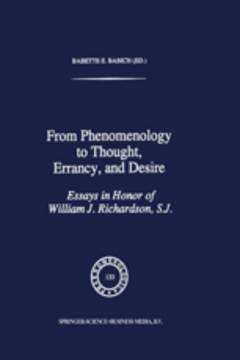The power of essential thinking in Heidegger's Beiträge zur Philosophie (vom Ereignis)
pp. 37-53
Abstract
The following reflections examine the nature and task of Heidegger's consistent attention to and fascination with the art of thinking. His many writings marking his pathway of thought, according to his intention and claim, trace a journey, a movement of meditative thinking; they forge ahead in the practice of and in educating for what is essential in the experience of thinking. Though the question of Being constitutes the main "matter" of thinking, of his philosophy, the labor indispensable for working out this question is the task of thinking. His teaching, in the final analysis, may be even more (surely not less) enlightening about thinking than about Being; it is time to recognize and thus to reckon with the fact that he is as much a philosopher of thinking as a philosopher of the "is," of the wonder and anxiety about the fact that there are beings and not rather nothing, that there is a historical, essential unfolding of Being as event, as appropriation (Ereignis). The preparation (education) for essential thinking constitutes a demanding historical task; it begins with the liberation from the illusion that logic in the traditional sense is the (only and ideal) teacher of thinking, that thinking is the function (exercise, activity) of the (intellectual, rational) faculty of human subjectivity. According to Heidegger's "Nachwort," written in 1943, to his inaugural lecture entitled "Was ist Metaphysik?" at the University of Freiburg, given in 1929, Being is not engendered by thinking (it is not the "product of thinking"); but rather "essential thinking is an event of Being."1 Thus the word "Ereignis" (event, appropriation) tells something, not only about Being (it becomes a "name" for Being), but also about thinking (it describes a more radical, inceptional, essential thinking). This event-nature of thinking and Being may be regarded as a lasting insight of Heidegger's philosophy. This study examines and raises some questions about the very idea and the power of this radical, essential thinking mainly in light of his Beiträge zur Philosophie (Vom Ereignis), his second main work (the first one being Sein and Zeit). It explores (1) the need for essential thinking, (2) the nature and the power of essential thinking, and (3) the final ambition and delimitation of (and some questions about) the power of essential thinking.
Publication details
Published in:
Babich Babette (1995) From phenomenology to thought, errancy, and desire: Essays in honor of William J. Richardson, S.J.. Dordrecht, Springer.
Pages: 37-53
DOI: 10.1007/978-94-017-1624-6_3
Full citation:
Kovacs George (1995) „The power of essential thinking in Heidegger's Beiträge zur Philosophie (vom Ereignis)“, In: B. Babich (ed.), From phenomenology to thought, errancy, and desire, Dordrecht, Springer, 37–53.


